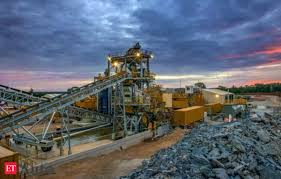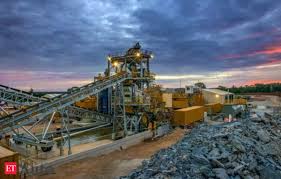
Amid the mounting uncertainty over the future of U.S. government support for the critical minerals sector, mining and battery recycling companies are racing against time to secure billions of dollars in loans before a potential shift in political leadership. With the possibility of former President Donald Trump regaining office, companies fear that crucial funding for projects aimed at boosting American production of minerals essential for the energy transition could be jeopardized.
Over the past few years, the U.S. Department of Energy's Loan Programs Office (LPO) has emerged as a pivotal source of financial support for companies working to strengthen the domestic supply chain for electric vehicles (EVs) and other clean energy technologies. Under President Joe Biden, the LPO has awarded nearly $25 billion in conditional loans to 21 companies, including prominent names such as Li-Cycle, ioneer, Lithium Americas, and Redwood Materials. These loans are intended to support the construction of facilities that recycle batteries and process critical minerals like lithium and nickel. However, with Trump’s potential return to the White House, the future of these projects now hangs in the balance.
The apprehension stems from Trump's pledge to "end the electric vehicle mandate" and concerns that he might follow through on plans to dismantle the LPO, as outlined in the Project 2025 document. This document, largely crafted by aides from his first term, envisions a significant rollback of the current administration's climate policies, including a potential shuttering of the LPO. As a result, companies that have secured conditional loans are scrambling to finalize these agreements before the next president takes office in January, fearing that any delays could lead to the collapse of crucial projects.
One mining executive, whose loan application is still pending, expressed concern about the unpredictability of a Trump administration, stating that the former president is "a wild card." This sentiment is echoed by several other industry leaders who are racing to finalize their loans before the political landscape shifts. However, many are finding that the complex and time-consuming nature of the LPO's loan approval process may hinder their efforts.
The LPO’s meticulous review process, which involves scrutiny by engineers, financial experts, and even the Energy Secretary herself, Jennifer Granholm, has been a double-edged sword. While it ensures that taxpayer money is responsibly allocated, it also means that only a fraction of applicants can navigate the complex requirements and secure timely approval. As one executive pointed out, the fear is that a change in administration could slow down or even halt the approval process, leaving crucial projects unfunded and potentially crippling the Western EV supply chain.
The stakes are high, particularly for projects involving the domestic supply of critical minerals. In Nevada, for instance, ioneer is pushing to close a $700 million LPO loan for its Rhyolite Ridge lithium project, which has an estimated cost of over $1 billion. Similarly, Lithium Americas, backed by General Motors, has already begun work on its nearly $3 billion Thacker Pass lithium project. The majority of its funding is expected to come from a $2.26 billion LPO loan, which the company aims to finalize by December.
The urgency extends beyond mining companies to recycling startups like Li-Cycle and Redwood Materials, which are also in the race to secure LPO loans. Redwood, for example, was conditionally approved for a $2 billion loan last year, but is still waiting for the funds to be disbursed. Without these financial lifelines, many of these projects could remain stuck in the planning phase, leaving the U.S. vulnerable to foreign market manipulation and further delaying the energy transition.
While the LPO has been a critical tool for advancing the U.S. clean energy agenda, the looming political uncertainty has cast a shadow over its future. The Energy Department maintains that its programs have historically continued across administration changes, emphasizing responsible stewardship of taxpayer money. Yet, the industry remains anxious about what the future holds, with executives questioning whether Trump’s statements on the issue are "rhetoric or actual policy."
As the clock ticks down to the next election, the race to secure funding has become a critical priority for companies relying on the LPO. The outcome of this race could have lasting implications for the U.S. energy transition and the broader battle against climate change.
(Source:www.reuters.com)
Over the past few years, the U.S. Department of Energy's Loan Programs Office (LPO) has emerged as a pivotal source of financial support for companies working to strengthen the domestic supply chain for electric vehicles (EVs) and other clean energy technologies. Under President Joe Biden, the LPO has awarded nearly $25 billion in conditional loans to 21 companies, including prominent names such as Li-Cycle, ioneer, Lithium Americas, and Redwood Materials. These loans are intended to support the construction of facilities that recycle batteries and process critical minerals like lithium and nickel. However, with Trump’s potential return to the White House, the future of these projects now hangs in the balance.
The apprehension stems from Trump's pledge to "end the electric vehicle mandate" and concerns that he might follow through on plans to dismantle the LPO, as outlined in the Project 2025 document. This document, largely crafted by aides from his first term, envisions a significant rollback of the current administration's climate policies, including a potential shuttering of the LPO. As a result, companies that have secured conditional loans are scrambling to finalize these agreements before the next president takes office in January, fearing that any delays could lead to the collapse of crucial projects.
One mining executive, whose loan application is still pending, expressed concern about the unpredictability of a Trump administration, stating that the former president is "a wild card." This sentiment is echoed by several other industry leaders who are racing to finalize their loans before the political landscape shifts. However, many are finding that the complex and time-consuming nature of the LPO's loan approval process may hinder their efforts.
The LPO’s meticulous review process, which involves scrutiny by engineers, financial experts, and even the Energy Secretary herself, Jennifer Granholm, has been a double-edged sword. While it ensures that taxpayer money is responsibly allocated, it also means that only a fraction of applicants can navigate the complex requirements and secure timely approval. As one executive pointed out, the fear is that a change in administration could slow down or even halt the approval process, leaving crucial projects unfunded and potentially crippling the Western EV supply chain.
The stakes are high, particularly for projects involving the domestic supply of critical minerals. In Nevada, for instance, ioneer is pushing to close a $700 million LPO loan for its Rhyolite Ridge lithium project, which has an estimated cost of over $1 billion. Similarly, Lithium Americas, backed by General Motors, has already begun work on its nearly $3 billion Thacker Pass lithium project. The majority of its funding is expected to come from a $2.26 billion LPO loan, which the company aims to finalize by December.
The urgency extends beyond mining companies to recycling startups like Li-Cycle and Redwood Materials, which are also in the race to secure LPO loans. Redwood, for example, was conditionally approved for a $2 billion loan last year, but is still waiting for the funds to be disbursed. Without these financial lifelines, many of these projects could remain stuck in the planning phase, leaving the U.S. vulnerable to foreign market manipulation and further delaying the energy transition.
While the LPO has been a critical tool for advancing the U.S. clean energy agenda, the looming political uncertainty has cast a shadow over its future. The Energy Department maintains that its programs have historically continued across administration changes, emphasizing responsible stewardship of taxpayer money. Yet, the industry remains anxious about what the future holds, with executives questioning whether Trump’s statements on the issue are "rhetoric or actual policy."
As the clock ticks down to the next election, the race to secure funding has become a critical priority for companies relying on the LPO. The outcome of this race could have lasting implications for the U.S. energy transition and the broader battle against climate change.
(Source:www.reuters.com)





